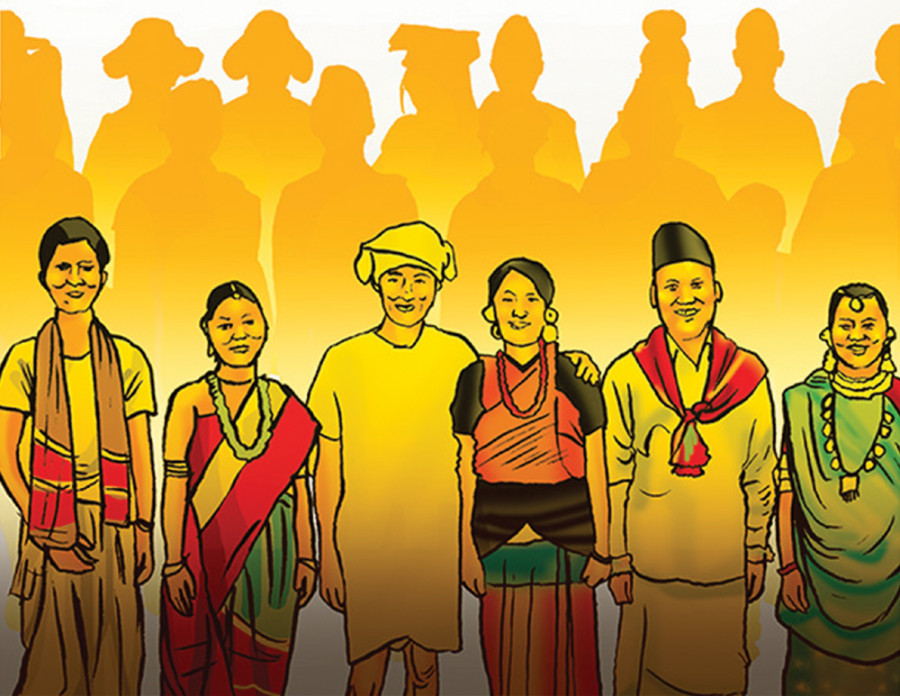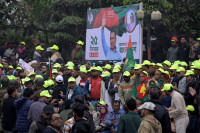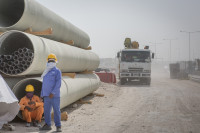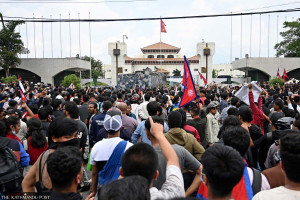Opinion
Power and discourse
Lack of an inclusive education system makes Nepalis ignorant of each other’s cultures and ways of life
Abhishek Mallick
Growing up in various parts of Nepal—from eastern Sankhuwasabha, Dhankuta and Biratnagar to central Rajbiraj, Janakpur and Kathmandu to mid-western Nepalgunj to far-western Mahendranagar and Baitadi—I came across many people belonging to diverse backgrounds, cultures and ethnicities. I take immense pride in saying that I made many friends across the country and continue to share deep bonds with them. It was during our interactions and cultural exchanges that I realised how conspicuously unaware we are about each other’s literature, arts and cultures, which, arguably, shape our perspectives more than anything else. It is unfortunate that most people from Sankhuwasabha or Baitadi have little understanding of Mithila varnashram, arts, crafts, language, script, food, etc, while people from Janakpur and Rajbiraj have little understanding of Newari culture. Similarly, people from Surkhet have little understanding of Rai culture, and people from the Awadh region have little understanding of Khas, Gurung and Tamang cultures, arts, scripts, etc.
We are only aware of each other’s geographical presence, and at times not even that. It deeply saddened me, and I wondered why, barring some intellectuals, we as a nation of about 30 million people spread in the area of hardly 147,181 square kilometres are so ignorant about each other’s arts and cultures. My curiosity was validated by my friends, who were just as baffled.
Unless we know or at least put an effort in knowing each other’s arts and cultures, respect for and celebration of diversity would be a distant dream and the ‘unity in diversity’ that this country stands for would only be confined to books. I am yet to find my answers, but I have learned that one of the major factors responsible for the debacle is our education system that has not only ignored better introduction and understanding of our diversity, but also censored it deliberately. This is probably linked to the power and power structures present in our country throughout centuries.
Power, according to Marxists, is the capacity of an agent to impose his will over the will of the powerless or the ability to force them to do things they do not wish to do. Althusser, a French philosopher, claims that “that power creates ideology or patriarchy which is an imaginary representation of the way things are in a society, and this fictive version of the world serves the interests of those who are dominant in society i.e. the elites”. He believes that the state which belongs to the elites oppresses people and individuals are simply dupes of ideological pressures. If Althusser is to be believed, the ideology created by dominant groups gets transferred and imbibed into our education system—curriculum and pedagogy in particular—which tends to get centralised around the dominant groups’ arts, cultures, literature and history, leading to an absence of the culture and history of other groups in the country’s education system. Althusser’s claim could be solid but that does not make it completely unbiased as it focuses primarily on the percolation of power from the top down. A competent and balanced concept of power has been discussed by Foucault, a French social theorist. He comes up with the idea of discourse, which I believe explains the issue more reasonably. Foucault refers to discourse as the general domain of all statements. It can be an instrument and an effect of power, but also a hindrance, a stumbling block, a point of resistance and a starting point for an opposing idea. He thus argues that discourse and power impact each other; discourse is both a means of oppression and of resistance. Rather than viewing power only in a negative way, as constrictive and repressive, he argues that oppressive measures are in fact productive, giving rise to new forms of behaviour rather than censoring certain practices.
Accordingly, I believe that the discourse created by power and vice-versa, shapes our views, opinions and policies of the education system, which makes the system as per the interests of powerful elites. However, if power and discourse affect each other as argued by Foucault, resistance to the education system that is in the interest of powerful elites would be observed because the working class or minority actively participates in the process. In this way, the working class or the minority is successful to some extent in changing the discourse and therefore the education system. Their arts, cultures, literatures and histories thus get included in the education system or at least there is sincere attempt towards it. Nonetheless, if the process ceases to be two-way, Foucault claims that the discourse turns into violence that the powerful impose on the powerless. There is no denying that there have been some positive amendments in the Nepali education system as Nepal underwent a series of movements in recent years. But their impact has not been strong enough to develop an inclusive education system that truly justifies the ‘unity in diversity’ slogan. It is high time policymakers and other stakeholders realised the problem and formed an inclusive education system that fosters genuine diversity.
Mallick is pursuing an MPhil in Development Studies from Kathmandu University




 12.12°C Kathmandu
12.12°C Kathmandu










%20(1).jpg&w=300&height=200)

